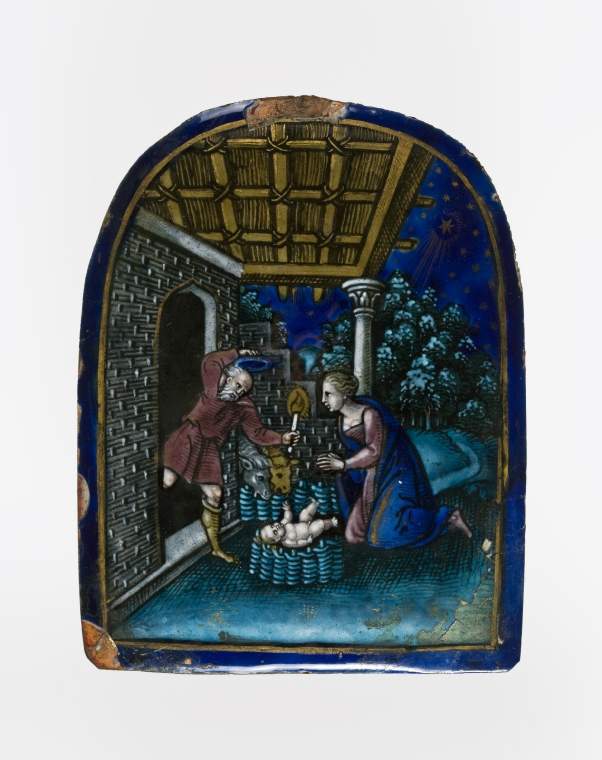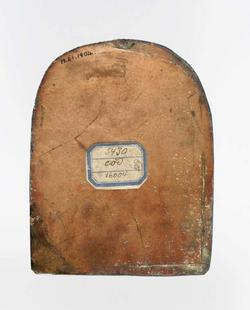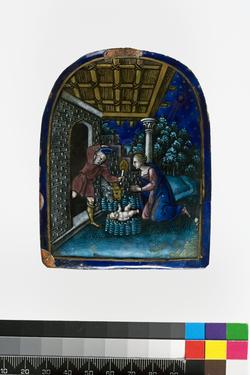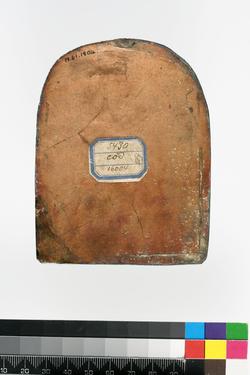Current Location: In storage
Titles
The Nativity
Maker(s)
Enameller:
Reymond, Pierre
(Workshop of)
Entities
Categories
Description
Rectangular copper plaque with arched top, decorated with polychrome enamels, and gilded. The Virgin kneels on the right before a wattled crib, and St Joseph holding a candle enters from the left through a doorway.
Rectangular convex copper plaque with arched top, enamelled on a white ground in dark blue, turquoise, yellow, pink, mulberry, brown, black, grey and white, and gilded. The reverse has clear counter-enamel.The Nativity is shown in an open loggia with a timber roof supported by a column. The Christ Child lies in the centre behind a turquoise wattled fence, watched by an ox and ass behind a similar fence. Mary kneels on the right with her hands together in prayer. She has fair hair, and wears a dark blue cloak over a mulberry dress. Joseph approaches through the door of a grey building on the left, raising his cap with his right hand and carrying a candle in his left. He has grey hair and beard, a blue hat, a mulberry tunic, and yellow boots (only one visible). The foreground is turquoise and in the background there are turquoise trees. The dark blue sky is scattered with gold stars, among which is one large star with rays. There are gold lines running round the door of the building, the edges of Mary’s cloak, and the edge of the candle, and the timbers of the roof are heavily gilded.
The plaque has carved wooden frame (A) in the form of a tabernacle with a half-figure of God the Father above the pediment with a shell-shaped niche above, and a winged cherub's head between foliated scrolls at the bottom. A rectangle in the middle of the pediment and a horizontal line above the lower moulding are gilded.
Notes
History note: Uncertain before testator, Frank McClean MA, FRS (1837-1904), Tunbridge Wells.
Legal notes
Frank McClean Bequest
Acquisition and important dates
Method of acquisition: Bequeathed
(1904)
by
McClean, Frank
Dating
16th Century, Mid
Renaissance
Circa
1545
CE
-
1560
CE
Note
The Reymond workshop produced large numbers of small arched rectangular plaques enamelled in polychrome or grisaille with religious subjects, including the Nativity, the Virgin and Child Enthroned, the Crucifixion,the Pietà, St . Jerome in Penitence, and the Holy House arriving at Loreto. Many of them would have been mounted as paxes, for use during Mass. Others may have been framed as small devotional images, sometimes hung over their owner's bedhead as 'images de chevet'.
The Nativity depicted on this plaque, was less common on Limoges enamels than the iconographical model showing Joseph and Mary adoring the Christ Child in front of a gabled stable. Dalton in his 1912 Catalogue of the McClean Collection identified the man entering from the left as one of the Shepherds because he is doffing his hat, but the shepherds are usually depicted as a group, so it seems more likely that he is intended to be Joseph, who is often depicted holding a candle or lantern. Positioned over the baby Christ, the flame of the candle emphasized to the viewer that he was the ‘true Light, which lighteth every man that cometh into the world’. Marquet de Vasselot in April 1911 described the plaque as 'A late work of the atelier of Pierre Reymond'. Bernard Rackham on 20 January 1921 recorded his view that it might be an early Pierre Reymond. It probably dates between these extremes in the middle of the century.
The grouping of the figures and animals in a loggia with a coffered ceiling can be compared with three arched plaques with differing architectural details attributed to Pierre Reymond or his workshop. One in the Metropolitan Museum of Art, New York, (inv. 45.16.14), one decorated in blue grisaille, and one in normal grisaille, sold in Paris respectively in 1993 and 2016. Two small circular polychrome plaques in the Victoria and Albert Museum differ from the Fitzwilliam's in having ruined arches in the background, and one of them lacks the coffered ceiling in the loggia (inv. nos. 482-1899 and 231F-1874). The architectural features of these plaques are reminiscent of circular prints of the Nativity and Adoration of the Shepherds by Georges Reverdy (active Lyon, c. 1529-64/65).
School or Style
Renaissance
People, subjects and objects depicted
Components of the work
Decoration
composed of
enamel
( dark blue,turquoise, yellow, pink, mulberry, brown, black, and white)
gold
Frame
composed of
wood
Height 22.5 cm
Width 1011 cm
Plaque
Height 10.4 cm
Width 8.1 cm
Materials used in production
Copper
Inscription or legends present
Inscription present: rectangular paper label with cut corners and blue border, crossed by two lines and inscribed in faded black ink
- Text: '5430/cod '[?] or 'cou' with a curved upward flourish/16004' and '69'
- Location: Applied to the centre of the back
- Method of creation: Printed in blue hand-written in faded black ink
- Type: Label
Inscription present: rectangular white paper label
- Text: BEQUEATHED BY/FRANK MCCLEAN/M.A.: F.R.S: F.R.A.S:/ of Trinity College/November MDCCCCIV
- Location: On back of frame
- Method of creation: Printed in black
- Type: Label
- Text: Frame/of/Dalton/69
- Location: On back below the other label
- Method of creation: Hand-written in black ink
- Type: Label
References and bibliographic entries
-
Fitzwilliam Museum, McClean Bequest, Catalogue of the Mediaeval Ivories, Enamels, Jewellery, Gems and Miscellaneous Objects Bequeathed to the Museum by Frank McClean, M.A., F.R.S.
page(s): 113
-
Catalogue des objets d'art et de haute curiosité de l'antiquité, du moyen âge, de la renaissances, des XVIIe et XVIIIe siècles. Faiences italiennes, ivoires, bronzes, objets de vitrine. Collection Cottreau
Identification numbers
Accession number: M.41 & A-1904
Primary reference Number: 156427
Stable URI
Audit data
Created: Saturday 6 August 2011
Updated: Tuesday 12 November 2024
Last processed: Thursday 14 August 2025
Associated departments & institutions
Owner or interested party:
The Fitzwilliam Museum
Associated department:
Applied Arts

 IIIF Manifest
IIIF Manifest






